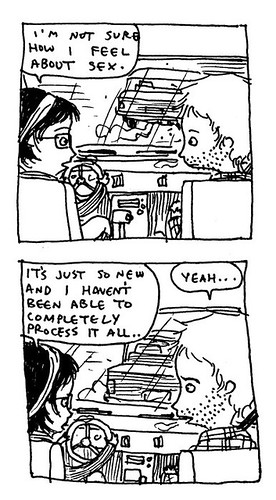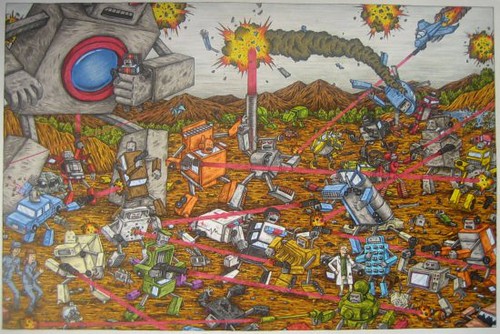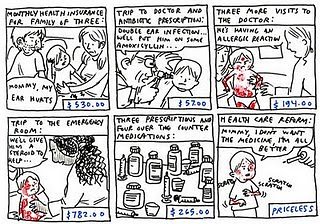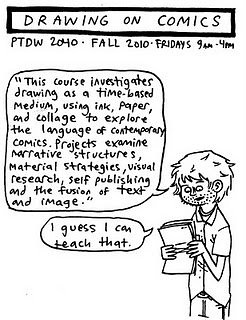| « Chris Ware's Self-Portrait | Guillen on Gatsby » |
One-Shots Thu Mar 24 2011
One-Shots: Jeffrey Brown
Coming from a childhood filled with religion and a high school career spent drawing on heavy metal and Moebius for sketch inspiration, Jeffrey Brown arrived in Chicago in 2005 to pursue an MFA at the School of the Art Institute Chicago, where the comic book influence that had been popping up in his art for years began to emerge in full force. Over the next few years, he went on to create Clumsy, Unlikely, and AEIOU or Any Easy Intimacy, which chronicled his relationships in minute emotional and stylistic detail, drawing them out in all their awkward, joyful, painful contexts. Although as close to Chicago as ever, these days Jeffrey's focus has shifted. We talked about the new directions his work is taking, how he got there, and how he views the work that placed him in the national consciousness.
Jeffrey Brown will be exhibiting at the Chicago Zine Fest this weekend.
Name: Jeffrey Brown
Job: Cartoonist, Illustrator, Comics Professor
Age: 35
Education: MFA SAIC 2002, BA Hope College 1997
Awards: Ignatz Award 'Outstanding Minicomic' 2003, Best American Comics 2007
Location: Lincoln Square
Hometown: Grand Rapids, MI
Website: http://www.jeffreybrowncomics.com
Favorite place in Chicago: The Field Museum
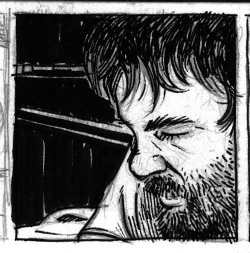
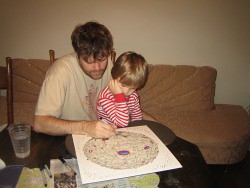
Self-portrait (with son on right)
When you started writing Clumsy, do you remember what spurred it?
There were a couple of things. I had a critique for the end of the year, where I had a particularly harsh group of faculty. It wasn't just me, I talked to other people that had that group there and they were...I was the only one in tears.
Had you ever had your art critiqued like that before?
I'd had critiques before but not where it was just..overwhelming. It got really personal, it wasn't just about the work, it was about as an artist, you will not make it. Not that a lot of what they were saying wasn't valid, but...at that point, the reason I went to grad school was that I knew I wanted my art to go somewhere. It was really stuck, and I didn't really know how to push any more. I certainly couldn't do it by myself in this bubble of Grand Rapids, and by going to grad school I was surrounding myself with other people making art, and trying to push myself that way. So that critique was one aspect.
Another aspect was seeing everyone else's work in grad school, it was like...a lot of it was so interesting, but at the same time so removed from real life in a way. It was just like art about art about art, and it just becomes this thing that's just really removed from any kind of real experience. It just seemed not personal anymore.
With Clumsy, I'd drawn some of those autobiographical things in the sketchbooks, people would look through those things and laugh and respond to them in a different way. So part of it was in the back of my mind, I thought I'd sit down and draw these autobiographical comics that would be as personal as I could make them. In reaction to seeing all this work that was so conceptual, I just went the opposite way, making it super explicit and personal and honest and direct as I could. Going back to the comics form, the most fun I ever had making art was when I was a kid drawing my own comics. And so that combined with the people responding to the sketchbooks, it was like I'll tell these really personal stories, and I'll tell them in comics form. And then as soon as I started, it just came out really easily. It was all a very conscious decision at the beginning that this was going to be a comic.
At that point, it was still coming from I guess a fine art perspective too, where I figured instead of a comic as this mass-produced publication I was going to draw this one comic, that would be the copy, it would be this art object. That was my initial thinking, like it would be kind of funny to have this single copy comic. All these kind of fine art things still in my mind when I started doing it. But I let people read it and look at it, was mostly friends that were seeing it. Their response was encouraging, so it was like...ok, Xeroxed copies so I could give those to friends, have a few to sell at Quimby's, have a few to sell here and there. Then it just kind of snowballed from there, that the response to those was good enough that I could self-publish. By the time I was self-publishing that book, drawing comics was coming less from a fine art direction, and more from a usual comics publishing direction.
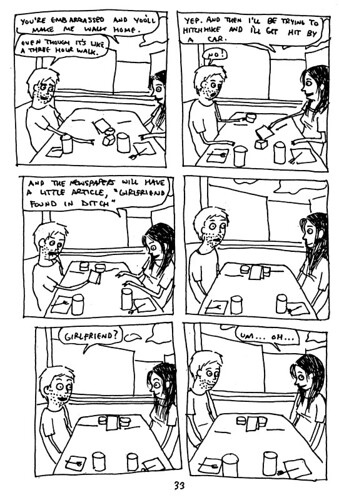
Clumsy [via]
Why did you start to shift from drawing comics like those in Clumsy and Unlikely to making something different, both in terms of subject matter and tone?
I guess, after I did the three books about girlfriends, I did Every Girl is the End of the World for Me, which is kind of like putting a cap on that kind of material in a way. So I feel like that was maybe the transitioning point, which was like 2005, or 2006. And then when I started doing the stories that were little things, and that felt like a transition.
Part of it was just consciously trying to have a different perspective, and writing about things differently than I had then. Part of it was a natural progression where like you look at the drawings from Clumsy to Unlikely, it's not that different, and from Unlikely to the next thing it's not that different, and when you look at how I draw the autobiographical stuff now, compared to how I drew Clumsy, it's really strikingly different. Some of it's just things I've let happen.
But as far as subject-wise, it's a slow transition to trying to write with more focus and perspective and be a little more particular about the stories I'm using...what ideas I'm trying to get at.
Do you feel like you filter yourself more?
Oh yeah. I mean, it's hard...when you're first starting, you're just getting these few scattered responses. You're aware that this work is going out to the world, but you're not so affected by feedback. Not that it's a case of someone says something about a book and it's like oh, I need to do things differently, but it's that kind of accumulation, the effect of just becoming more aware of how that work is operating in the outside world.
What do you mean?
How people are reading it, what they're getting out of it. Realizing that there are different ways things could be taken. There's probably nothing I could point to specifically, but I know that there's a slightly different mindset that I go into writing something that's autobiographical.
How is it different?
Just in terms of thinking about how before, I was just telling these stories to friends, so I'm not worried about what anyone's going to think of me, or thinking about people judging me. For better or worse, it was just telling what happened, and how I felt at the time. And now it's more like maybe feeling like I need to add the extra perspective of me being aware now as an artist, so it's less straightforward documentary. Trying to look back a little more and maybe have a little more insight in addition to whatever it's doing on the surface.
What pushed you towards your more recent work? Superheroes? Cats?
That started when I was doing Unlikely, which is out of print now. That was a conscious decision, here I'm doing this thing that's really emotionally involved and self-referential...trying to do something to balance that, something goofy and fun and there ends up being personal stuff that I put in there, but I don't know, I try to go back and forth from doing something that's a little more quote unquote serious, as the more autobiographical stuff tends to be, to doing something that's more funny. I think they started to mix a little bit, but it's a very slow process of having that all change.

Cat doodle on the back of a print
Do you feel like having a son has changed how you work?
Yeah. In general, your perspective on life changes. There's all these cliches and all of a sudden, I guess that cliche is true. Things that I used to worry about just seem silly now, other things that used to not be so affecting are way more affecting.
Maybe that ties into that shift in subject of the autobiography books. Talking about going in with a different mindset or perspective. I think that's part of it. Being a dad, and having this other relationship. It also ties into being more careful about what I write about my life, and being more careful about what I write about him. I've started to be more comfortable about writing about being a dad and situations with him. He's older now, and he talks and says funny things.
A lot of your comics focus on young adulthood, being in your 20s. Do you ever feel the urge to go back and make comics about your childhood?
That's actually the next autobiographical thing I'm going to do, is write some stories about me growing up, and a little bit about my relationship with religion, which is a little bit about my dad, who's a minister, and then my relationship with Oscar, so it's stories that deal with fatherhood and religion. It's a book about fatherhood and religion -- those are what all the stories are related to in a way, so it seems like I'm trying to be smarter than I am. It's a combination of my childhood, mostly childhood stories dealing with growing up in the church.
I also want to do -- I did a mini-comic version of this, called Early Works, where I just picked out my favorite childhood drawings, the funniest, weirdest ones. I want to do that as a more collected book and then intersperse that with comics that are stories from childhood that maybe don't fit in any kind of bigger narrative. I used to love playing football when I was a kid. A story about how I broke my wrist, and how it ties into this class assignment about what do you want to be when you grow up, mine were like drawer of comics, and my backup was be a professional football player.
It's trying to get at these meaningful things, in the way I did with Clumsy, because it's this very direct, personal thing. There's not that need to have all this connotation and annotation to it. Like someone will either read it, and relate to it, and get something out of it, or they won't. I don't want to try and weave something together to provide that artificially.
In college, I was really into writing poetry, and when I finished college I thought I'd write books of poetry with drawings in them. I think what always interested me about poetry was reducing things down and getting them to the essence of something in a very nuanced way...it's a very simple way of getting at very complicated things. And you just let the reader make those connections themselves, rather than have it all built into the structure.






